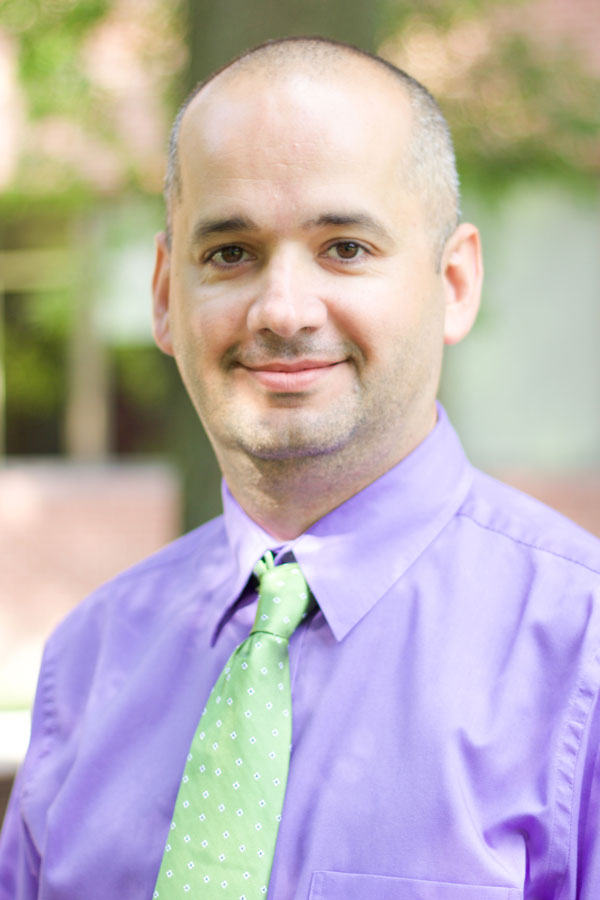Faculty illustrate, present papers and publish
Composition professor receives award for scholarship

University of Pittsburgh at Bradford faculty illustrated a book, received an award, gave talks, published and more during the 2022-2023 academic year.
Dr. Wes Chiang, assistant professor of marketing, and Dr. Ken Wang, associate professor of computer information systems and technologies, were among the authors of the paper “Investigating the Effect of Transformational Leadership in Mutual Fund Accounting and Administration” in the Journal of Management Science and Business Intelligence.
Chiang also took part in an online panel discussion organized by Zippia about what aspiring graduates can do to start off their careers in an uncertain economic climate and was interviewed by WalletHub.com.
Dr. Drew Flanagan, visiting assistant professor of history, presented a paper, “French Civilization vs. Nazi Barbarism: Westernizing the Franco-German Borderlands, 1945-1955,” at the Society for French Historical Studies annual conference in Charlotte, N.C., last month.
Dr. Ovidiu Frantescu, associate professor of environmental science, illustrated the 840-page “Evolution and Phylogeny of Pancrustacea: A Story of Scientific Method” published by Oxford University Press in late 2021.
Dr. Tony Gaskew, professor of criminal justice, published a book chapter, “The Ritual of Black Armed Resistance: Police Abolition through the Eyes of the Black Radical Tradition,” in “Wicket Problems: The Ethics of Action for Peace Rights and Justice” published by Oxford University Press.
Dr. Amy Gresock, assistant professor of business management, was invited to participate in the inaugural Strategic Leadership Forum at the Army Heritage and Education Center, formerly the U.S. Army War College.
Additionally, she presented her work with business students at the Community Engaged Scholarship Forum at the University of Pittsburgh’s Pittsburgh campus.
Dr. Tracee Howell, assistant professor of English, presented a paper, “And its Discontents: The City in Afrofuturist American Fiction,” at the Pacific and Ancient Modern Language Association Annual Conference, where she also served as chair of a panel titled “The City in Afrofuturism.”
Dr. Nancy McCabe, professor of writing, had a second book released as an Audible Audiobook by Redwood Publishing, “Can This Marriage Be Saved? A Memoir.”
She published a number of short works, including the following essays: “Rapture in the Zoom” at Salon.com in September, which was selected for and reposted as part of its Best of 2021 feature in December; “Playing by the Rules,” at The Manifest Station; “Crimes Against Property” at Another Chicago Magazine; “Tearing Down the House” in Essay Daily; and “Far-Side Banks for Jordan” in Entropy.
Additionally, she published the following poems: “Pajama Dolls” and “Combing a Niece’s Hair” at Coachella Review and “Corn” in Spillway.
Currently on a sabbatical, this semester she taught a 10-week workshop for the Creative Nonfiction Foundation called “The Shapes of Stories” and a five-week workshop called “The Healing Power of the Artful Essay.”
Finally, Dr. ’Biodun Ogundayo, associate professor of French and comparative literature, published poems in the journal African American Review and “Sorosoke: An “EndSARS Anthology,” featuring poems about police brutality in Nigeria that took place in response to non-violent protests against violence by the country’s Special Anti-Robbery Squad against young Nigerians in 2020.
Dr. Adedoyin Ogunfeyimi, assistant professor of composition, received the 2022 Robert Hacke Teacher Scholar Award for his ongoing work in composition and rhetoric from the College English Association at its annual conference, where he also presented a paper.
Additionally, Ogunfeyimi published “The Rhetoric and Grammar of African Subjectivity: Ethics, Image, and Language” in the journal The Review of Communication.
Dr. Josie Rush, instructor of composition, published a chapter, “Converging in a Room of Our Own: The Ladder, Autostraddle, and Queer Convergence in Online Communities,” in the newly published “Routledge Handbook of Queer Rhetoric.”
--30--